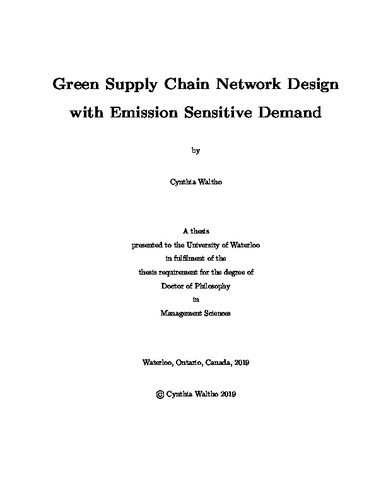| dc.description.abstract | Over the last few decades, the argument for a link between greenhouse gas emissions and global warming has become stronger. In response, there has been a global shift. Politicians are implementing carbon policies while consumers are becoming more aware of their own impact on the environment. This thesis explores how environmental policies and consumer awareness impact supply chain network design and provides a new modelling framework in which demand is dependent on carbon footprint.
In the first part of the thesis, a comprehensive literature review on green supply chain network design between 2010 and mid 2017 is presented. The review focuses on models and methodologies that explicitly include carbon emissions and environmental policies. It is evident that incorporating carbon policy is popular, particularly carbon cap, carbon offset, cap-and-trade, and carbon tax. By reconfiguring the supply chain and investing in lower-emitting resources, each policy is able to achieve significant emission reduction with marginal increase in total cost. This is achieved by reconfiguring the supply chain and investing in lower-emitting resources. The review finds that there is a lack of models that consider the complex nature of emissions. Other complexities, such as multivariate emissions and uncertainty, are considered in only a few papers. Most importantly, however, it is clear that demand as a function of supply chain emissions is rarely accounted for in supply chain network design literature.
In the second part, a two echelon supply chain with emission sensitive demand is considered. A new model is provided that determines at which points investments in lower emitting technologies at the warehouses is necessary. Being nonlinear due to the complex carbon footprint constraint, the resulting model is first reformulated as a second-order cone program, and is tested on a hypothetical e-commerce supply chain. The results illustrate that without proper response to consumer preferences, companies will lose out on revenue. It also illustrates investments are made at clear points as consumer sensitivity to emissions increases, rather than continuously. This work is important for e-commerce companies who wish to set themselves apart from competitors by catering to environmentally conscious consumers.
The third part of the thesis presents a new model for green supply chain network design with emission sensitive demand. The supply chain is composed of one plant and multiple warehouses that serve multiple customer zones. Decisions pertaining to the technology type used at the plant, the location and technology of the warehouses, the assignment of customer zones to warehouses, and the flow between the different echelons are modelled. In addition, demand is modelled as a function of carbon footprint. The resulting model is nonlinear due to the carbon footprint constraint. To be able to solve it, we reformulate the problem as a second-order cone program. To test the model and draw insights from it, we build a hypothetical, but realistic potato chip supply chain located in the province of Ontario, Canada. The testing confirms the ability of the model to trade-off between demand and emissions for environmentally conscious customers and provides insight into to how companies could advertise carbon footprint information to capture demand, and their potential impact on the supply chain. | en |

